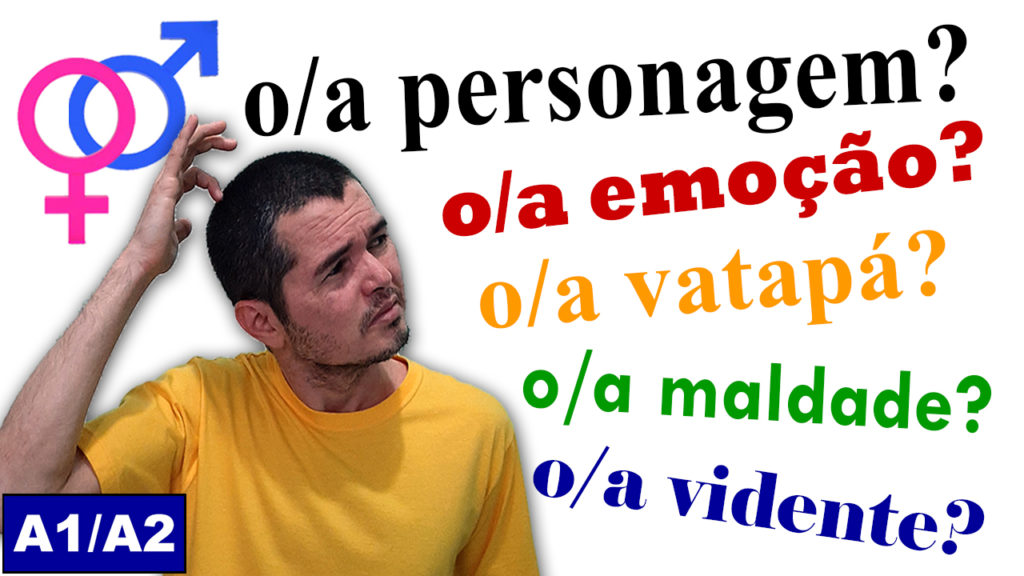How to know if a noun is masculine or feminine? In this video you’ll learn the top rules to determine gender in Brazilian Portuguese.
Identifying the gender of words is one of the most confusing things in Portuguese. Even intermediate students struggle with that.
Why do we say a cama, but we say o dilema if both end with “a”?
Why do we say o coração, but we say a mão if both end with “ão”?
It’s confusing, right? But, did you know that there are rules that help us to identify the gender of nouns?
Yeah. There are! And today you’re gonna learn these rules.
There are things that only Ricardo teaches you!
Your life will never be the same after you watch this lesson. Take your pen and notebook. And let’s begin!
1 – Most words ending in -O are masculine:
O caderno
O carro
O vaso
O teclado
2 – Most words ending in -AL are masculine:
O ritual
O jornal
O sal
O canal
O avental
O festival
O musical
O sinal
Exception: a vogal.
3 – Most words ending in -R are masculine:
O jantar
O açúcar
O amanhecer
O lar
O hambúrguer
O sabor
O lugar
O amor
O calcanhar
O vapor
O calor
O lazer
O fedor
O cadáver
O câncer
O revólver
All verbs with noun function: o olhar, o fazer, o amanhecer, o andar etc.
Exceptions: a colher, a mulher, a dor, a flor, a cor.
If you dont know how to pronounce these and other portuguese sounds take a look at my pronunciation series.
4 – Words ending in stressed -Á are usually masculine:
O maracujá
O sofá
O chá
O Canadá
O tamanduá
O vatapá
O crachá
5 – Most concrete nouns ending in -ÃO are masculine:
O pão
O coração
O sabão
O chão
O balão
O vagão
O corrimão
6 – The majority of nouns ending in -EMA, -OMA are masculine:
O cinema, o sistema, o problema, o dilema…
O idioma, o sintoma, o coma, o diploma…
Exceptions: a goma, a soma.
7 – Most nouns ending in -A are feminine.
A mala
A janela
A luva
A causa
A fruta
A blusa
A roupa
A bota
Some exceptions: o dia, o samba, o tapa, o planeta, o cometa, o mapa, etc.
8 – Most words ending in -GEM are feminine:
A bagagem
A viagem
A maquiagem
A mensagem
A tatuagem
Exception: o/a personagem.
UNLOCK YOUR PORTUGUESE WITH MY COURSES
9 – Most words ending in -DADE are usually feminine:
A cidade
A liberdade
A idade
A oportunidade
A gravidade
A maldade
A sanidade
A saudade
10 – Most nouns ending in -ÇÃO, -SÃO are feminine. They correspond to English nouns ending in -tion, -sion:
A emoção
A educação
A imigração
A poluição
A imersão
A ilusão
A visão
A missão
A noção
A nação
11 – Words with the ending -TUDE are feminine:
A juventude
A plenitude
A altitude
A amplitude
A atitude
12 – Words ending in -ISTA can be masculine or feminine, most indicate an occupation:
O jornalista / a jornalista
O dentista / a dentista
O motorista / a motorista
O massagista / a massagista
O manobrista / a manobrista
O esteticista / a esteticista
O artista / a artista
O malabarista / a malabarista
13 – Words ending in -ANTE, -ENTE can be masculine or feminine:
O estudante / a estudante
O viajante / a viajante
O assaltante / a assaltante
O gerente / a gerente
O assistente / a assistente
O vidente / a vidente
14 – Some words can be masculine or feminine depending on the meaning. Examples:
O capital: money / A capital: the capital (city);
O cara: the guy / a cara: the face;
O rádio: the radio, radium / o rádio chemical element / a rádio: the radio station.
O moral: morale, morality / a moral (of a story);
O grama, gram (measure) / a grama, the grass;
O guia, the guide (man or book). O guia turístico / a/o guia, the guide (person): o/a guia de turismo.








